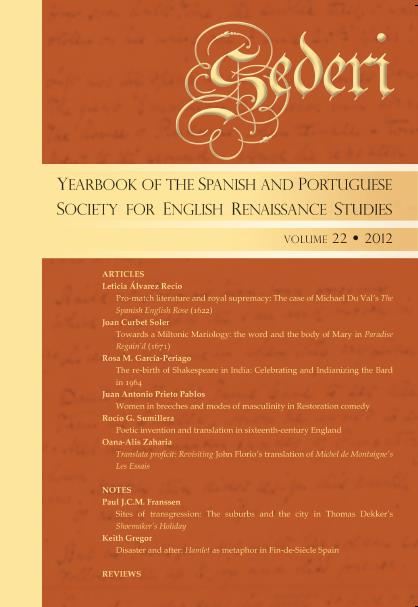Translata Proficit: Revisiting John Florio’s translation of Michel de Montaigne’s Les Essais
Keywords:
John Florio, Montaigne’s Les Essais, Elizabethan practice and theory of translation, rewriting, fondness for words, literal translationAbstract
Abstract
This paper considers John Florio’s famous translation of Montaigne’s Essays as a source of invaluable insight into the Elizabethan practice and theory of translation. In the letter addressed to the reader, Florio strongly advocates the use of translation as a means of advancing knowledge and developing the language and culture of a nation. Echoing the Elizabethan debate between the defenders and detractors of translation, his preface provides precious information on the various Elizabethan understandings of the role of translation. Casting himself in the role of a “foster-father”, Florio foregrounds the idea of translation as rewriting of the original text into a new creation. While most scholars have emphasised solely Florio’s augmentation of Montaigne’s text and his fondness for addition, paraphrase and alliteration, the present paper intends to demonstrate that this dimension of his translation is frequently complemented by Florio’s tendency to render the text closely, even word for word at times..
Downloads
Downloads
Published
Issue
Section
License
The copyright holder of the published contributions is SEDERI.The hardcopy and an open-access version of the journal will be published simultaneously. The issues will be available online in the SEDERI website (http://www.sederi.org/yearbook/) and other repositories that have signed an agreement with SEDERI.
The authors who publish with this journal agree to the following terms:
a) SEDERI retains copyright of the essay.
b) If the author wishes to republish or rewrite the essay for another journal, or include the essay published in SEDERI in their personal repositories, or in any other way, they should contact the editors to obtain permission to do so. This will entail citing SEDERI as the original source and sending the editors a copy of the new version, or the link to the website, in case of online publishing.
The author(s) hereby warrant(s) that:
a) The essay submitted for publication is an original creation and does not infringe any copyright or property right of another journal, author or publisher.
b) The essay submitted for publication has not been previously published, whole or in part, and is not being considered for publication elsewhere.
c) Written permission has been obtained for any material from other sources included in the essay submitted for publication.




